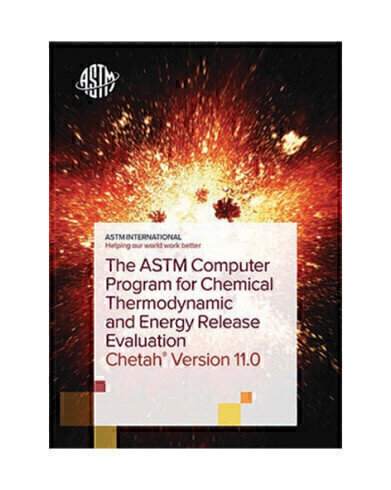Fuel for Thought
Updated ASTM computer program for chemical thermodynamic and energy release evaluation
Jul 31 2020
ASTM’s CHETAH (Chemical Thermodynamic and Energy Release) program is a unique tool for predicting both thermochemical properties and certain reactive chemicals hazards associated with pure chemical, a mixture of chemicals, or a chemical reaction. This is accomplished through knowledge of only the molecular structure(s) of the components involved by an implementation of Benson's method of group additivity. CHETAH is useful for classifying materials for their ability to decompose with violence, for estimating heats of reaction or combustion, for prediction of chemical equilibrium, and for predicting lower flammable limits.
This most updated version of CHETAH Version 11.0 has an improved interface to enhance ease of use. Various property databases have now been reviewed for consistency and accuracy. Updated thermodynamic values are provided for 20 Benson groups based on latest best values in the literature. The database for ideal gas Benson groups has been expanded and now contains 1,165 groups. It is the largest Benson group database known to exist. In all, 66 new groups have been added. 47 groups have been updated or include additional data. Entropy values were predicted and added to the database for many ideal gas Benson groups that were missing such values. This also enables Gibb’s Free Energy calculations for these groups. Output reports have been improved for clarity of presentation. It is now possible to generate pdf format reports direct from the interface as well as Microsoft Word© documents.
Aside from significant improvements from the previous version, NASA Lewis chemical equilibrium calculations are now available for the first time within CHETAH. This allows the user to predict equilibrium compositions, pressures, and temperatures of a user selected list of reactants. The extensive database of chemicals within the CHETAH databases can be used as reactant chemicals. Also, chemicals not in the databases or even in the published literature can be entered as reactants by making use of the Benson group molecular fragment database. CHETAH 11.0 uses Microsoft Access for database management and to manage the user interface. The calculation details are accomplished in the Visual Basic for Applications structure of Access and in C language. CHETAH 11 is designed to be compatible and seamless with the current versions of the Microsoft Windows operating system. CHETAH 11.0 now maintains a clear record of use with details of past sessions. Past sessions can easily be modified and recalculated. Past sessions from the previous version CHETAH 10 can be moved to CHETAH 11.0.
Current users of Version 10.0, who are considering upgrading to Version 11.0, should first download and install Ver. 10.0 Service Pack 3 (SP-3). Ver 10.0 SP-3 is a free download and includes the ability to backup past sessions so they can be restored later into Version 11.0. Please see the CHETAH 10.0 support information on the Support Page
It is now much easier to establish and maintain a user database of proprietary data to enhance the usefulness of CHETAH. The user database is portable to future versions or service packs.DS51
Current users of Version 10.0, who are considering upgrading to Version 11.0, should first download and install Ver. 10.0 Service Pack 3 (SP-3). Ver 10.0 SP-3 is a free download and includes the ability to backup past sessions so they can be restored later into Version 11.0. Please see the CHETAH 10.0 support information on the Support Page
It is now much easier to establish and maintain a user database of proprietary data to enhance the usefulness of CHETAH. The user database is portable to future versions or service packs.
CHETAH 11.0 is a product of ASTM Committee E27 on Hazard Potential of Chemicals. The Committee is responsible for the technical content of the program and guides its continuing development. The actual implementation of changes to the program is implemented by a team at the University of South Alabama, Mobile, AL.
Digital Edition
PIN 25.1 Feb/March
March 2024
In This Edition Safety - The technology behind the ION Science Tiger XT - Safety with ammonia and LOHCs as hydrogen carriers Analytical Instrumentation - Discussion on new tribology te...
View all digital editions
Events
Apr 28 2024 Montreal, Quebec, Canada
Apr 30 2024 Birmingham, UK
May 03 2024 Seoul, South Korea
May 05 2024 Seville, Spain
May 06 2024 Riyadh, Saudi Arabia


















